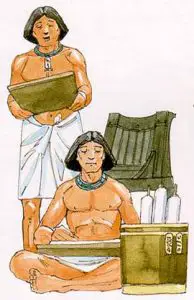Knowledge was valued by ancient Egyptians. The learnt was superior to the unlearned. A scribe, pictured as a seated man with crossed legs, holding an open papyrus roll on his lap was the possessor of knowledge in ancient Egypt. Almost all of our known knowledge about the ancient Egyptians came from the work and art of the ancient Egyptian scribes.

Egyptian Scribes were the civil servants of the country. Scribe was an excellent career to adopt. The scribes had high education and training. They had the opportunity to rise to high ranks which brought them wealth, labour and power.
It is interesting to note that on an average; only 1 out of every 100 Egyptians could read and write. Scribes were these literate few. There were hundreds of hieroglyphs to remember and thus being a scribe was not an easy task. In ancient Egypt, most people followed the occupations of their fathers. Therefore, most scribes were sons of scribes.
Majority of the scribes came from wealthy families. Only boys could go to the school and become scribes. Egyptian scribe was in charge of a variety of jobs.
Writing letters for the illiterate, recording the amount of harvested crops, ordering supplies for temples and the Egyptian army, recording history and extraordinary happenings, and collecting taxes constitute their principal duties.
Advanced Egyptian Scribes
They also worked as law administrators, controllers of the food supply, supervisors of building construction and conductors of population census. Additional roles for advanced scribes who were promoted included the roles of engineers, priests, judges, doctors and teachers.
Ancient schools were run by scribes and were called scribe schools. The ablest scribes taught the future Pharaoh at the Prince’s school. Reading, writing, Mathematics, Astronomy, Science, Music, Geography included the subjects taught by the scribes.
The scribes had to be conversant with different styles of writing which included Hieroglyphics, Hieratic writing and in later years of the Egyptian periods the Demotic script. The scribes sat Indian style holding his writing board in his lap. The god Thoth was revered as the God of Wisdom and was also the scribe of the gods and the inventor of writing.
Scribes were the keepers of oral tradition. By the time of the New Kingdom, this ability to compose new literary texts was widespread. They went beyond simply preserving the old texts and instead and had the creativity to edit and revise the theological, liturgical, medical, and sacred texts. Among such texts were biographies, instructions, literary, historical, and political propaganda.
